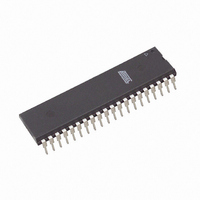AT89C51ED2-3CSIM Atmel, AT89C51ED2-3CSIM Datasheet - Page 81

AT89C51ED2-3CSIM
Manufacturer Part Number
AT89C51ED2-3CSIM
Description
IC 8051 MCU FLASH 64K 40DIP
Manufacturer
Atmel
Series
89Cr
Datasheet
1.ATWEBDVK-02RC.pdf
(137 pages)
Specifications of AT89C51ED2-3CSIM
Core Processor
8051
Core Size
8-Bit
Speed
60MHz
Connectivity
SPI, UART/USART
Peripherals
POR, PWM, WDT
Number Of I /o
34
Program Memory Size
64KB (64K x 8)
Program Memory Type
FLASH
Eeprom Size
2K x 8
Ram Size
2K x 8
Voltage - Supply (vcc/vdd)
2.7 V ~ 5.5 V
Oscillator Type
External
Operating Temperature
-40°C ~ 85°C
Package / Case
40-DIP (0.600", 15.24mm)
Data Bus Width
8 bit
Data Ram Size
64 KB
Interface Type
SPI, UART
Maximum Clock Frequency
60 MHz
Number Of Programmable I/os
32
Number Of Timers
3 x 16 bit
Operating Supply Voltage
2.7 V to 5.5 V
Maximum Operating Temperature
+ 85 C
Mounting Style
Through Hole
Minimum Operating Temperature
- 40 C
Lead Free Status / RoHS Status
Contains lead / RoHS non-compliant
Data Converters
-
Lead Free Status / Rohs Status
No
Available stocks
Company
Part Number
Manufacturer
Quantity
Price
Company:
Part Number:
AT89C51ED2-3CSIM
Manufacturer:
ATMEL
Quantity:
77 760
18.3
18.3.1
18.3.2
Figure 18-1. Power-Down Exit Waveform Using INT1:0#
4235K–8051–05/08
Power-Down Mode
Entering Power-Down Mode
Exiting Power-Down Mode
INT1:0#
OSC
The Power-Down mode places the AT89C51RD2/ED2 in a very low power state. Power-Down
mode stops the oscillator, freezes all clock at known states. The CPU status prior to entering
Power-Down mode is preserved, i.e., the program counter, program status word register retain
their data for the duration of Power-Down mode. In addition, the
served. The status of the Port pins during Power-Down mode is detailed in Table 18-1.
Note:
To enter Power-Down mode, set PD bit in PCON register. The AT89C51RD2/ED2 enters the
Power-Down mode upon execution of the instruction that sets PD bit. The instruction that sets
PD bit is the last instruction executed.
Note:
There are three ways to exit the Power-Down mode:
Note:
Note:
Active phase
1. Generate an enabled external interrupt.
2. Generate a reset.
– The AT89C51RD2/ED2 provides capability to exit from Power-Down using INT0#,
– A logic high on the RST pin clears PD bit in PCON register directly and
INT1#.
Hardware clears PD bit in PCON register which starts the oscillator and restores the
clocks to the CPU and peripherals. Using INTx# input, execution resumes when the
input is released (see Figure 18-1). Execution resumes with the interrupt service
routine. Upon completion of the interrupt service routine, program execution
resumes with the instruction immediately following the instruction that activated
Power-Down mode.
asynchronously. This starts the oscillator and restores the clock to the CPU and
peripherals. Program execution momentarily resumes with the instruction
immediately following the instruction that activated Power-Down mode and may
VCC may be reduced to as low as V
pation. Take care, however, that VDD is not reduced until Power-Down mode is invoked.
If VCC was reduced during the Power-Down mode, do not exit Power-Down mode until VCC is
restored to the normal operating level.
The external interrupt used to exit Power-Down mode must be configured as level sensitive
(INT0# and INT1#) and must be assigned the highest priority. In addition, the duration of the inter-
rupt must be long enough to allow the oscillator to stabilize. The execution will only resume when
the interrupt is deasserted.
Exit from power-down by external interrupt does not affect the
Power-down phase
Oscillator restart phase
RET
during Power-Down mode to further reduce power dissi-
AT89C51RD2/ED2
SFRs
SFR
Active phase
and RAM contents are pre-
nor the internal RAM content.
81
















